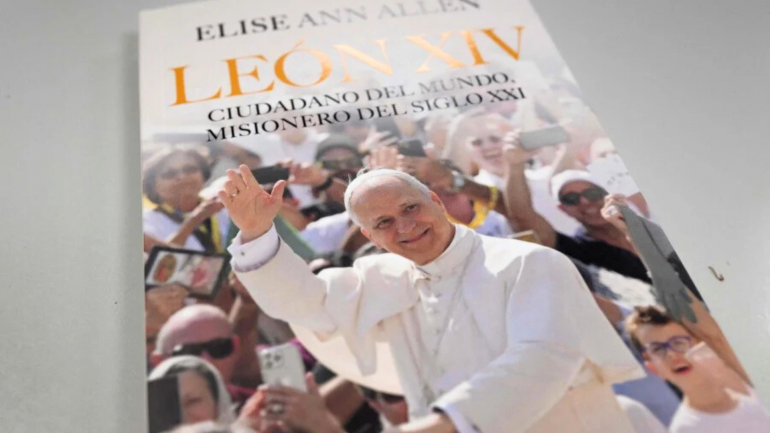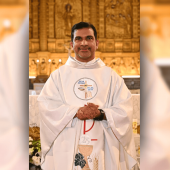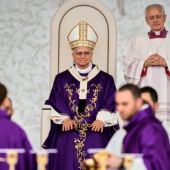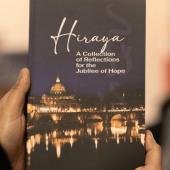Pope Leo XIV: World Citizen and Missionary

On September 18, a new biography of Pope Leo was released, based on a two-part interview between Pope Leo XIV and Crux Senior Correspondent Elise Ann Allen. The book ‘León XIV: ciudadano del mundo, misionero del siglo XXI’ (‘Leo XIV: Citizen of the World, Missionary of the XXI Century’) has been published in Spanish. The wide-ranging interview was conducted on July 10 and 30. It was Pope Leo’s first interview after being elected Pontiff on May 8.
Pope Leo candidly responded to questions on several topics. These included the tragedy in Gaza, understanding of papacy, views on Synodality, desire for peace (including Ukraine), relations with China, role of women in the church, approach to the LGBTQ+ community, and to traditionalists who want access to the pre-Vatican II liturgy, and how the Church should respond to artificial intelligence. He also spoke about how he, as the first Pope from the United States, envisages relating to President Donald Trump.
The title of the book aptly describes Pope Leo as a world citizen and a missionary. In the interview, he reveals these two complementary dimensions, both in his character and as a way of proceeding. In order to understand the depth and the breadth of Pope Leo’s vision and mission, and him as a person, one needs to visit some of his responses
He says that he is learning all the time in his new job. What will define his papacy will be his worldview. He says, “The totally new aspect to this job is being thrown onto the level of world leader. I am learning a lot about how the Holy See has had a role in the diplomatic world for many years…Those things are all new to me in any sense of hands-on. I’ve followed current affairs for many, many years. I’ve always tried to stay up on the news, but the role of pope is certainly new to me. I’m feeling very challenged, but not overwhelmed.”
Pope Leo is unequivocal about the situation in Gaza and has consistently spoken about it even these past six weeks, after the interview. He says, “There has not been a clear response in terms of finding effective ways to alleviate the suffering of the people, the innocent people in Gaza, and that is obviously of great concern…. They’re going to need a lot of help, medical assistance as well as humanitarian aid, to really turn that situation around, and right now it still looks very, very grave. We can’t grow numb, and we can’t ignore this. Somehow, we have to continue to push, to try and make a change there”.
He makes a strong case for peace, calling for an end to all wars, especially in Ukraine. For Pope Leo, it is imperative to build bridges. “The way of building bridges is primarily through dialogue….one of the things that I’ve been able to do in these first couple of months is have at least some kind of dialogue. We live in times when polarization seems to be one of the words of the day, but it’s not helping anybody. Or if it’s helping anyone, it’s very few, when everyone else is suffering. So to continue to raise those questions,”
Pope Leo is a missionary, having spent half of his priestly life working among the poor in Peru. As an Augustinian, he has visited China and even India. He is convinced that what has also contributed to polarization includes “the continuously wider gap between the income levels of the working class and the money that the wealthiest receive…for example CEOs 60 years ago might have been making four to six times more than what the workers are receiving, the last figure I saw, it’s 600 times more than what average workers are receiving. If that is the only thing that has value anymore, then we’re in big trouble.”
He is clear on Synodality, saying, “Some people have felt threatened by it… Sometimes, bishops or priests might feel, ‘Synodality is going to take away my authority.’ That’s not what synodality is about, and maybe your idea of what your authority is, is somewhat out of focus, mistaken…. I think that synodality is a way of describing how we can come together and be a community and seek communion as a Church, so that it’s a Church whose primary focus is not on an institutional hierarchy, but rather on a sense of ‘we together’,
With regard to the LGBTQ+ community, he said that he does not have “a plan at the moment,” but embraces Pope Francis’ message of welcome to all, “todos, todos, todos.” “Everyone’s invited in, …but I don’t invite a person in because they are or are not of any specific identity. I invite a person in because they are a son or daughter of God. You’re all welcome, and let’s get to know one another and respect one another.” On the role of women in the Church, he says, “I hope to continue in the footsteps of Francis, including in appointing women to some leadership roles at different levels in the Church's life, recognizing the gifts that women have that can contribute to the life of the Church in many ways.”
Pope Leo’s interview reads like a manifesto: for himself and how he intends his papacy to unfold! Given his stand on critical issues, he is clearly showing that he is walking in the footsteps of Pope Francis. On the other hand, given his comments on ‘polarization’, he seems determined to do a balancing act on the tight-rope, doing his best to bring together the various factions on the same table!
One thing is certain that in this Jubilee Year, we have a Pope who is a pilgrim of hope: a true citizen of the world, with the heart of a zealous missionary!
(Fr. Cedric Prakash SJ, an Indian Jesuit, is a human rights, reconciliation, environmental & peace activist/writer. He can be contacted at [email protected])
Radio Veritas Asia (RVA), a media platform of the Catholic Church, aims to share Christ. RVA started in 1969 as a continental Catholic radio station to serve Asian countries in their respective local language, thus earning the tag “the Voice of Asian Christianity.” Responding to the emerging context, RVA embraced media platforms to connect with the global Asian audience via its 21 language websites and various social media platforms.












